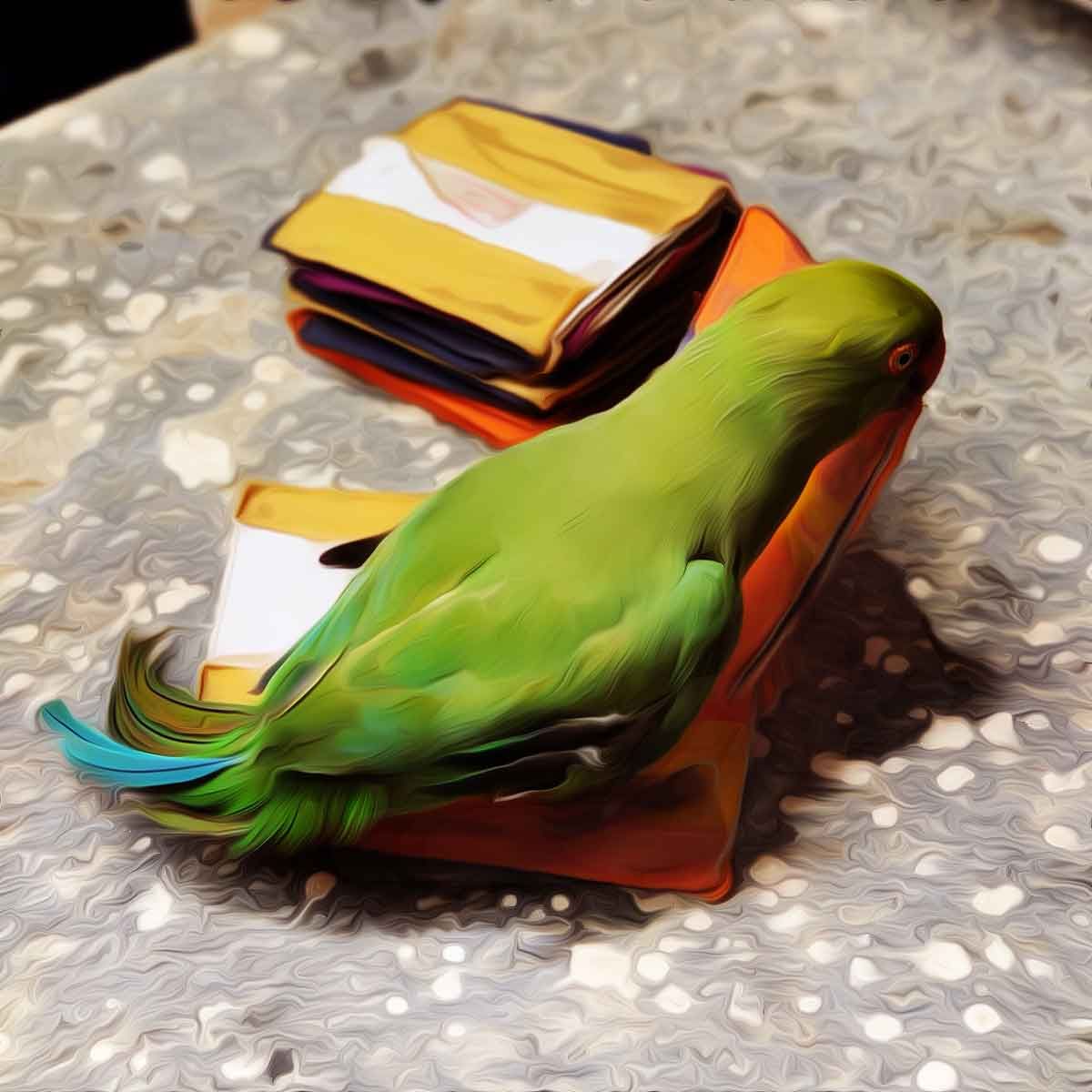More Coverage
Twitter Coverage
Satyaagrah
Written on
Satyaagrah
Written on
Satyaagrah
Written on
Satyaagrah
Written on
Satyaagrah
Written on
JOIN SATYAAGRAH SOCIAL MEDIA
"Animal protector or anti-Hindu organization": After seeking ban on Temple elephants, Jallikattu and Kambala buffalo race, PETA goes after Kili Josiyars - Fortune-Tellers Using Parakeets, 7 Arrested By Tamil Nadu Forest Department

For centuries people across the world have tried various means to divine what the future holds for them……pendulums, spirit boards, tarot cards, crystal gazing, palmistry, or even the pattern left by tea leaves or coffee dregs in the bottom of a cup!
Kili Jodishyam
Parrot astrologers foretell your future with the help of green parakeets, called Kili in Tamil, hence the name Kili Jodishyam. The parrot is trained to pick up cards from a deck on cue, and choose that one perfect match, from which the astrologer interprets the client's future and answers specific questions! The deck is not an ordinary deck but neither is it any familiar tarot type. The card is picked particularly by the parrot and contains meaningful messages for your life.
Parrot Astrology is an intriguing blend of science, skill, and mysticism practiced only by skilled astrologers who are gifted with the extra power of predicting your future. The origin of the Parrot Astrology dates back to the ancient Indian traditions and today is widely mastered in the Southern regions of India-Tamil Nadu and Kerala.
|
Unconventional, Unexpected, Unbelievable!
It may seem like a novel act at first however, the messages that come to you from the card, chosen for you by the parrot, may hold the hidden clues you’ve been searching for. Ask 3 Questions and let the Parrot Astrologer decipher the messages of the match of you card and your basic info. You’ll see it is more than a sideshow
|
PETA India filed a complaint
The Tamil Nadu Forest Department arrested seven Kili Josiyars (fortune-tellers using parakeets) based on a complaint by PETA India, an organization that claims to work for animal rights. PETA India had filed a complaint after one stand-up comedian Sunil Grover posted a reel on his Instagram in which he listens to a fortune-teller using a parakeet to predict his future.
Acting on PETA India’s complaint, the Tamil Nadu Forest Department swung into action taking the fortune-tellers into custody. The fortune-tellers have been booked under Sections 9, 39, and 51 of the Wildlife Protection Act (WPA), 1972.
While parakeets are a protected species under Schedule IV of the WPA, it is a common sight in Tamil Nadu to see a Kili Josiyar outside temples, at popular beaches, and other places where tourists frequent. In the olden days, a Kili Josiyar used to earn his bread by going village after village for fortune-telling.
Several communities like the Malai Veduvar (tribal) and Kambalathu Naicker (Other Backward Caste) communities have been carrying on the ancient tradition of Kili Josiyam for ages.
With time and lack of patronage, the tradition has been dwindling with several generations of the community moving on to do other things.
This is not the first time that PETA has gone after indigenous communities and their practices. PETA India tried to meddle with the breeding of indigenous cow and bull breeds by seeking a ban on Jallikattu. Similarly, in Karnataka, they moved the court to ban the Kambala buffalo race. They have also been going after temple elephants. Very recently they were instrumental in taking away Lakshmi the elephant from her home in Manakula Vinayagar Temple in Puducherry by the forest department saying that she was being ‘ill treated’. PETA India had also filed a petition at the Rajasthan High Court to ban elephant rides in Amber fort.
Amul vs PETA
The People for the Ethical Treatment of Animals (PETA) asked Amul to switch to producing vegan milk in 2021, drawing a sharp response from the dairy giant. The non-profit organization asked Amul to benefit from the booming vegan food and milk market. The animal body told Amul in a letter, “If you can’t beat them, join them”, pointing to the rising interest in “vegan milk”.
Hitting back, Amul vice-chairman Valamji Humbal urged Prime Minister Narendra Modi to ban PETA India and accused it of ruining people's livelihood. He also slashed rumors of animal cruelty and said that people in India raise milch animals as family members. Maintaining that PETA's demand is a part of the misinformation campaign, Humbal added that it is an attempt to break the Indian dairy industry, saving the country from importing milk and milk products.
|
India’s dairy giant Amul issued a public interest advertisement on Tuesday, busting myths about plant-based beverages in a bid to tell off non-profit entities that are suggesting alternatives to milk over charges of animal cruelty in the dairy industry. Highlighting the cultural and spiritual significance of dairy in India, the Gujarat Cooperative Milk Marketing Federation, which oversees Amul, published an advertisement to present “facts” against “myths” about plant-based products.
 |
PETA urged the Tamil Nadu government to withdraw the jallikattu order
On May 7, 2014, the Supreme Court of India banned the traditional bull-taming sport conducted in Tamil Nadu -- Jallikattu -- after a 10-year-long battle by animal activists and animal welfare organizations like the Federation of India Animal Protection Agencies (FIAPO) and People for the Ethical Treatment of Animals (PETA).
Jallikattu, in the simplest of terms, is a sport conducted as part of Mattu Pongal, the third day of the four-day-long harvest festival Pongal. The Tamil word 'mattu' means bull, and the third day of Pongal is dedicated to cattle, a key partner in the process of farming. Bulls get more importance over cows for bulls to help farmers to plow their fields, pull their carts loaded with goods, and inseminate cows, in turn resulting in the production of milk, offspring, and preserving indigenous species.
Temple bulls, usually considered the head of all cattle in a village, are readied for the sport. Temple bulls from different villages are brought to a common arena where the Jallikattu happens.
The bulls are then freed into the ground, one by one. Participants are to embrace the bull's hump and try to tame it by bringing the raging bull to a stop, possibly by riding for as long as possible while holding its hump. The bulls that could be tamed are considered weaker and are used for domestic purposes by the farmers, and the untameable ones -- considered the strongest and most virile -- are used for breeding the cows in many villages.
Jallikattu is believed to be a tradition practiced for at least the last 2,500 years. Cave paintings, as old as 2,500 years, that depict a man trying to tame a bull, have been found by archeologists. Jallikattu in the present form is believed to have played first between 400 to 100 BC.
Jallikattu is key to the farmers. It is a chance for them to flaunt their personal strength, the strength of their bulls, love for their cattle and how well they have looked after them, and a chance to find out the most potent bull to breed with their cows.
Jallikattu is not a leisure sport for Tamils, but a tradition that establishes the identity of a hard-working, self-sufficient, powerful Tamil. Jallikattu also symbolizes a cordial man-animal relationship, reads the op-ed. "For the owner, the bull was a member of the family. Native breeds used in bullfights ensured biodiversity and acted as geographical indicators," B Thirumalai of Madurai told The Hindu.
|
People of Tamil Nadu flooded the streets, cities, and villages alike, and protested against the Supreme Court ban on Jallikattu. People felt more driven since superstars from Kollywood, including A-listers like Rajinikanth, Kamal Haasan, Vijay, Vikram, Suriya, Dhanush, and Simbu supported the protests.
Actor Vijay, in a short video he posted on social media platforms, said, "Law was not created to rob people off their tradition and rights but to protect it. Jallikattu is every Tamil's identity. Those who are protesting against the ban on Jallikattu are united by the feeling that they are Tamils and not out of compulsion or political pressure. I bow down to each and every one of them."
|
Finally, in 2017 Lawmakers in Tamil Nadu passed an emergency order on Monday allowing “jallikattu” festivals to resume after a court ban on the traditional events led to mass protests. “Jallikattu will be celebrated. We urge the protesters to go back home immediately,” said senior police officer P.K.Kannan in Chennai, Tamil Nadu’s capital.
Thousands of people had taken part in a week of protests, which also hit the state’s auto industry.
|
Recently, we wrote an article about how cow for slaughter is raised from the rooftop ahead of Eid-al-Adha in Pakistan, but PETA never seems to care or bother about such cruelty.
|
Following are 3 examples of cruelty to animals done where PETA has become completely deaf and dumb.
|
|
|
Request all readers to tag PETA in every of your post if you ever find any cruelty against animals, as it will keep exposing the double standards of PETA propaganda against Hindu sentiments.
 Support Us
Support Us
Satyagraha was born from the heart of our land, with an undying aim to unveil the true essence of Bharat. It seeks to illuminate the hidden tales of our valiant freedom fighters and the rich chronicles that haven't yet sung their complete melody in the mainstream.
While platforms like NDTV and 'The Wire' effortlessly garner funds under the banner of safeguarding democracy, we at Satyagraha walk a different path. Our strength and resonance come from you. In this journey to weave a stronger Bharat, every little contribution amplifies our voice. Let's come together, contribute as you can, and champion the true spirit of our nation.
 |  |  |
| ICICI Bank of Satyaagrah | Razorpay Bank of Satyaagrah | PayPal Bank of Satyaagrah - For International Payments |
If all above doesn't work, then try the LINK below:
Please share the article on other platforms
DISCLAIMER: The author is solely responsible for the views expressed in this article. The author carries the responsibility for citing and/or licensing of images utilized within the text. The website also frequently uses non-commercial images for representational purposes only in line with the article. We are not responsible for the authenticity of such images. If some images have a copyright issue, we request the person/entity to contact us at This email address is being protected from spambots. You need JavaScript enabled to view it. and we will take the necessary actions to resolve the issue.
Related Articles
- "Bone China: The Untold Truth in a Name": Did you know Bone China is made from cow & ox bones? For Sanatan Dharma followers, it contradicts Ahimsa's core values, explore the surprising truth behind this popular crockery and its clash with ancient beliefs
- "Creative without strategy is called ‘art.’ Creative with strategy is called ‘advertising": As per a new study from research group 'Light Collective', Digital Medical companies funnel sensitive data of patients with Facebook to help target advertisements
- PETA India’s latest wisdom – Cows are killed for beef because you are drinking milk and eating cheese
- "Pimp stands for Positive Intellectual Motivated Person. It has nothing to do with selling sex for money": ‘Misinformation seems to be the hallmark of Global Hunger Report. Index is an erroneous measure of hunger and suffers methodological issues’: India
- Operation Tupac is up and running by ISI of Pakistan in collaboration with Foreign-based organisations to lobby against India on global forums: Disinfo Lab report reveals Fascism, Genocide and Islamophobia used as a keyword
- Kerala Gold smuggling case: Co-accused PS Sarith abducted by few unknown persons from Swapna Suresh's home on Wednesday morning just minutes after explosive revelations in press conference
- "Evidence Against Teesta Setalvad": She is arrested for false testimony in Gujarat riots and how Congress, Teesta Setalvad, Sanjiv Bhatt and Times of India colluded against Narendra Modi, and US Government regular interaction with the cabal
- Self-styled controversial Christian Prophet Bajinder Singh, infamous for fake ‘healing camps’ to hold a meeting in Mumbai at MMRDA Ground: Johnny Lever, Rakhi Sawant, and other celebrities promote
- "Teesta Setalvad exploited emotions of Zakia Jafri", said Supreme Court in its judgment: Gujarat ATS takes Teesta Setalvad into custody, even the affidavits of the victims were signed by the NGOs, things were fabricated this way
- Post 9/11 discrimination and Islamophobia: all labeled as 'Emotional Truths' were actually fabrications, Meet Hasan Minhaj, the ace comedian and 'victim card' player, who rocked the world with harrowing tales in his comedy—tales that, never truly happened
- "Profit Over Patriotism, Mahua Cash Query Dish": IT Minister Chandrasekhar unveils Moitra's possible favoritism towards private firms; Adani Group highlights orchestrated attacks; BJP's Dubey alleges Moitra's Parliament misconduct linked to Hiranandani
- Govt imposes ban on 23 aggressive dog breeds such as Pitbulls, Rottweilers, Mastiffs, Doberman, and German Shepherds to curb attacks and protect citizens, PETA supports the initiative, aiming to prevent dog attacks and promote responsible pet ownership
- "Whoever profits by the crime is guilty of it": Philippines court issues international arrest warrant for Bill Gates in connection to Covid19 vaccine rollout, excess deaths & injuries reported after vaccine drive, Gates Foundation prevents media reporting
- India heralds a new era in its investigative framework with the proposed Chief Investigation Officer post, Sanjay Mishra, with his sterling record, is poised to pioneer this role, but not without a trail of debates and legal intricacies surrounding him
- "A leader is one who knows the way, goes the way, and shows the way": Swapna Suresh, the prime accused in the gold smuggling case, alleged that Kerala Chief Minister Pinarayi Vijayan helped the UAE consulate in facilitating the escape of a terrorist




























